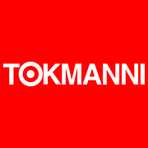Tokmanni Group: A Snapshot of Recent Managerial Transactions
June 4, 2025, 10:32 pm

Location: Netherlands, North Holland, Amsterdam
Employees: 10001+
Founded date: 1932
In the bustling world of retail, every transaction tells a story. Recently, Tokmanni Group Corporation, a leading variety discount retailer in the Nordics, made headlines with a series of managerial transactions. These transactions, while seemingly routine, reveal the underlying dynamics of corporate governance and employee incentives within the company.
On June 2, 2025, Tokmanni announced several transactions involving its board members. Each transaction was linked to the receipt of share-based incentives, a common practice in corporate structures aimed at aligning the interests of management with those of shareholders. The details of these transactions are crucial for understanding the company's strategic direction and the motivations of its leadership.
Mikko Bergman, a deputy member of the board, received 1,203 shares as part of his incentive package. The transaction occurred on May 28, 2025, at the NASDAQ Helsinki. Notably, the unit price for these shares was reported as zero euros. This raises questions about the nature of the incentive program. Are these shares part of a broader strategy to retain talent? Or are they a reflection of the company's performance metrics?
Similarly, Erkki Järvinen, another deputy board member, received a larger allocation of 2,552 shares. His transaction also took place on the same date and venue, with the same zero-euro price tag. The volume of shares awarded to Järvinen suggests a significant level of trust in his capabilities and contributions to the company. It also indicates a potential for greater influence in future corporate decisions.
Seppo Saastamoinen, yet another deputy member, was awarded 1,713 shares under the same incentive program. The consistency in the transaction details across these three board members hints at a standardized approach to compensation within Tokmanni. This could be seen as a strategic move to foster a unified leadership team, all working towards common goals.
Tokmanni Group operates in a competitive landscape, with over 6,000 employees across Finland, Sweden, and Denmark. The company prides itself on making everyday life easier for its customers by offering a diverse range of products at affordable prices. With more than 380 stores under various brands, including Tokmanni, Dollarstore, and Big Dollar, the company is well-positioned to cater to a broad customer base.
In 2024, Tokmanni reported impressive financial figures, with revenues reaching EUR 1,675 million and a comparable EBIT of EUR 100 million. These numbers reflect a robust business model and a commitment to providing value to customers. However, the recent managerial transactions raise questions about how these incentives will impact future performance.
Share-based incentives are designed to motivate managers to drive company performance. When leaders have a stake in the company's success, they are more likely to make decisions that benefit shareholders. However, the effectiveness of such programs can vary. If the share price does not reflect the company's true value, the incentives may lose their intended impact.
Moreover, the timing of these transactions is noteworthy. Announced on the same day, they create a narrative of collective action among the board members. This could signal a strategic pivot or a response to market conditions. The synchronization of these transactions may also indicate a concerted effort to bolster investor confidence.
Tokmanni's exclusive rights to sell SPAR products in Finland since 2025 further complicate the landscape. This partnership could enhance the company's product offerings and attract a wider customer base. However, it also places additional pressure on management to deliver results. The share-based incentives may serve as a tool to ensure that the leadership remains focused on achieving these goals.
As the retail sector continues to evolve, companies like Tokmanni must adapt to changing consumer preferences and market dynamics. The recent managerial transactions reflect a proactive approach to governance and compensation. By aligning the interests of management with those of shareholders, Tokmanni aims to foster a culture of accountability and performance.
In conclusion, the recent transactions involving Tokmanni's board members are more than just numbers on a page. They represent a strategic alignment of interests, a commitment to performance, and a response to the competitive retail landscape. As the company moves forward, these incentives will play a crucial role in shaping its trajectory. Investors and stakeholders will be watching closely, eager to see how these decisions translate into tangible results. The road ahead is filled with potential, but it will require careful navigation and a steadfast focus on delivering value.
On June 2, 2025, Tokmanni announced several transactions involving its board members. Each transaction was linked to the receipt of share-based incentives, a common practice in corporate structures aimed at aligning the interests of management with those of shareholders. The details of these transactions are crucial for understanding the company's strategic direction and the motivations of its leadership.
Mikko Bergman, a deputy member of the board, received 1,203 shares as part of his incentive package. The transaction occurred on May 28, 2025, at the NASDAQ Helsinki. Notably, the unit price for these shares was reported as zero euros. This raises questions about the nature of the incentive program. Are these shares part of a broader strategy to retain talent? Or are they a reflection of the company's performance metrics?
Similarly, Erkki Järvinen, another deputy board member, received a larger allocation of 2,552 shares. His transaction also took place on the same date and venue, with the same zero-euro price tag. The volume of shares awarded to Järvinen suggests a significant level of trust in his capabilities and contributions to the company. It also indicates a potential for greater influence in future corporate decisions.
Seppo Saastamoinen, yet another deputy member, was awarded 1,713 shares under the same incentive program. The consistency in the transaction details across these three board members hints at a standardized approach to compensation within Tokmanni. This could be seen as a strategic move to foster a unified leadership team, all working towards common goals.
Tokmanni Group operates in a competitive landscape, with over 6,000 employees across Finland, Sweden, and Denmark. The company prides itself on making everyday life easier for its customers by offering a diverse range of products at affordable prices. With more than 380 stores under various brands, including Tokmanni, Dollarstore, and Big Dollar, the company is well-positioned to cater to a broad customer base.
In 2024, Tokmanni reported impressive financial figures, with revenues reaching EUR 1,675 million and a comparable EBIT of EUR 100 million. These numbers reflect a robust business model and a commitment to providing value to customers. However, the recent managerial transactions raise questions about how these incentives will impact future performance.
Share-based incentives are designed to motivate managers to drive company performance. When leaders have a stake in the company's success, they are more likely to make decisions that benefit shareholders. However, the effectiveness of such programs can vary. If the share price does not reflect the company's true value, the incentives may lose their intended impact.
Moreover, the timing of these transactions is noteworthy. Announced on the same day, they create a narrative of collective action among the board members. This could signal a strategic pivot or a response to market conditions. The synchronization of these transactions may also indicate a concerted effort to bolster investor confidence.
Tokmanni's exclusive rights to sell SPAR products in Finland since 2025 further complicate the landscape. This partnership could enhance the company's product offerings and attract a wider customer base. However, it also places additional pressure on management to deliver results. The share-based incentives may serve as a tool to ensure that the leadership remains focused on achieving these goals.
As the retail sector continues to evolve, companies like Tokmanni must adapt to changing consumer preferences and market dynamics. The recent managerial transactions reflect a proactive approach to governance and compensation. By aligning the interests of management with those of shareholders, Tokmanni aims to foster a culture of accountability and performance.
In conclusion, the recent transactions involving Tokmanni's board members are more than just numbers on a page. They represent a strategic alignment of interests, a commitment to performance, and a response to the competitive retail landscape. As the company moves forward, these incentives will play a crucial role in shaping its trajectory. Investors and stakeholders will be watching closely, eager to see how these decisions translate into tangible results. The road ahead is filled with potential, but it will require careful navigation and a steadfast focus on delivering value.

